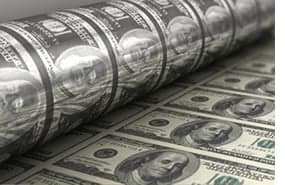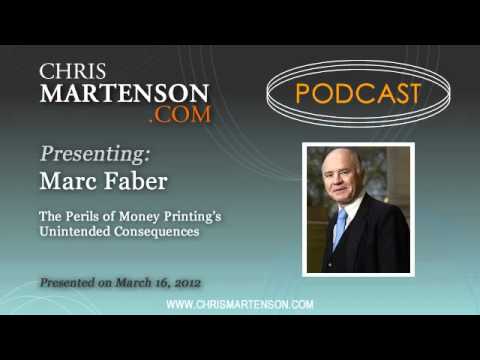The dangers of money printing are many, in his eyes. But in particular, he worries about the unintended consequences it subjects the populace to. Beyond currency devaluation, it creates malinvestment that leads to asset bubbles that wreak havoc when they burst. And even more nefarious, money printing disproportionately punishes the lower classes, resulting in volatile social and political tensions.
It's no surprise, then, that he's feeling particularly defensive these days. While he generally advises those looking to protect their purchasing power to invest capital in precious metals and the equity markets (the rationale being that inflation should hurt equity prices less than bond prices), he warns that equities appear overbought at this time.
On Inflation
First of all, I do not believe that the central banks around the world will ever, and I repeat ever, reduce their balance sheets. They’ve gone the path of money printing, and once you choose that path you’re in it and you have to print more money.
If you start to print, it has the biggest impact. Then you print more – it has a lesser impact, unless you increase the rate of money printing very significantly. And, the third money-printing has even less impact. And the problem is like the Fed: They printed money because they wanted to lift the housing market, but the housing market is the only asset that didn’t go up substantially.
In general, I think that the purchasing power of money has diminished very significantly over the last ten, twenty, thirty years, and will continue to do so. So being in cash and government bonds is not a protection against this depreciation in the value of money.
On His Love for Central Bankers
Basically the U.S. had a significant increase in the average household income in real terms from the late 1940s to essentially the mid-1960s. And then inflation began to bite, and real income growth slowed down. Then came the 1980s, and in order not to disappoint the household-income recipients, you essentially printed money and had a huge debt expansion.
So if you have an economic system and you suddenly grow your debt at a very high rate, it's like an injection of a stimulant of steroids. So the economy grew at a relatively fast pace, but built on additional debt. And this obviously cannot go on forever, and when it comes to an end, you have a problem. But the Fed had never paid any attention.
The Fed is about the worst economic forecaster you can imagine. They are academics. They never go to a local pub. They never go shopping – or they lie. But basically they are a bunch of people who never worked a single day in their lives. They’re not businessmen that have to balance the books, earn some money by selling goods, and pay the expenditures. They get paid by the government. And so these people have no clue about the economy.
And, so what happens is they never paid any attention to excessive credit growth – and let me remind you, between 2000 and 2007, credit growth was five times the growth of the economy in nominal terms. In other words, in order to create one dollar of GDP, you had to borrow another five dollars from the credit market. Now this came to an end in 2008.
Now the Fed never having paid any attention to credit growth, they realized if we have a credit-addicted economy and credit growth slows down, we have to print money. So that’s what they did. But believe me, it doesn’t take a rocket scientist to see that if you print money you don’t create prosperity. Otherwise, every country would be unbelievably rich, because every country would print money and be happy thereafter.
On the Unintended Consequences of Money Printing
In the short term, it has been working to some extent, in the sense that equity prices are up and interest rates are down. And, so companies can issue bonds at extremely low rates. But every money-printing exercise in the world leads to unintended consequences at a later point. And this is the important issue to remember. We don’t know yet for sure what the unintended consequences are.
We know one unintended consequence, and this is that the middle class and the lower classes of society, say 50% of the U.S., has rather been hurt by the increase in the quantity of money in the sense that commodity prices in particular food and energy have gone up very substantially. And, since below 50% of income recipients in the U.S. spend a lot, a much larger portion of their income on food and energy than, say, the 10% richest people in America and highest income earners, they have been hurt by monetary policy. In addition, the lower income groups, if they have savings, traditionally they keep them in safe deposits and in cash because they don’t have much money to invest in the first place. So the increase in the value of the S&P hasn’t helped them, but it helped the 5% or 10% or 1% of the population that owns equities. So it's created a wider wealth inequality, and that is a negative from a society point of view.
Click the play button below to listen to Chris' interview with Marc Faber (runtime 40m:45s):
iTunes: Play/Download/Subscribe to the Podcast
Download/Play the Podcast (mp3)
Report a Problem Playing the Podcast
Or click here to read the full transcript.
Dr. Faber publishes a widely read monthly investment newsletter, The Gloom Boom & Doom Report, which highlights unusual investment opportunities, and is the author of several books including Tomorrow's Gold – Asia's Age of Discovery, which was first published in 2002 and highlights future investment opportunities around the world. Tomorrow's Gold was on Amazon's best seller list for several weeks and is being translated into Japanese, Chinese, Korean, Thai, and German. Dr. Faber is also a regular contributor to several leading financial publications around the world.
Between 1970 and 1978, Dr. Faber worked for White Weld & Company Limited in New York, Zurich, and Hong Kong. Since 1973, he has lived in Hong Kong. From 1978 to February 1990, he was the Managing Director of Drexel Burnham Lambert (HK) Ltd. In June 1990, he set up his own business, MARC FABER LIMITED, which acts as an investment advisor and fund manager.
Our series of podcast interviews with notable minds includes:
- Robert Mish
- Erik Townsend
- Ben Davies
- Jim Rickards
- Chris Martenson (answers your questions)
- Charles Eisenstein
- James Dines
- John Mauldin
- Jack Keller
- Rick Rule
- Robert Rapier
- Gordon Chang
- Turd Ferguson
- Eric Janszen
- Paul Brodsky
- Carolyn Baker
- David Stockman
- Rob Hopkins
- Joel Salatin
- Charles Hugh Smith
- Frank Barbera
- Nate Hagens
- David Morgan
- James Turk
- Eric Sprott
- John Rubino
- Addison Wiggin
- Simon Black
- Axel Merk
- Paul Tustain
- Francis Koster
- Dogs_In_A_Pile
- Bud Conrad
- John Williams
- Robert McFarlane
- David Collum
- Joe Saluzzi
- Jim Rogers
- Bill Fleckenstein
- Marc Faber
- Willet Kempton
- Dan Ariely
- Ted Butler
This is a companion discussion topic for the original entry at https://peakprosperity.com/marc-faber-the-perils-of-money-printings-unintended-consequences-2/

